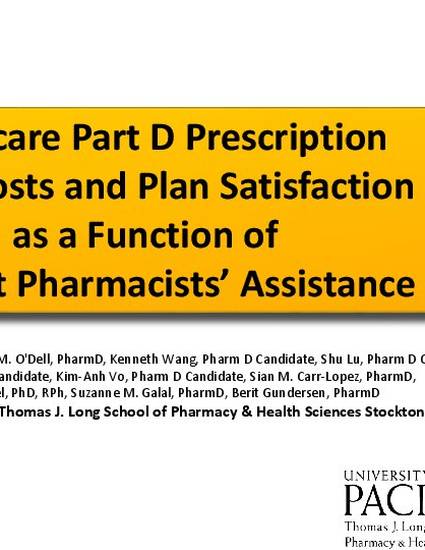
Background: Beneficiaries can become overwhelmed by the myriad of Medicare Part D (MPD) plans that offer prescription drug coverage. Poor choice and increased out-of-pocket (OOP) costs can be reduced through annual plan reevaluation. Objective: To examine beneficiaries' plan satisfaction and MPD drug costs as a function of prior assistance from trained student pharmacists. Methods: Twelve outreach events, nine at the same location as the previous year, were held throughout Northern/Central California during October-November 2012. Trained student pharmacists, at each event, identified the MPD plan best meeting a beneficiary's needs based on their current medications and personal preferences (e.g., preferred pharmacy). Beneficiary demographic data, subsidy status, MPD plan cost data (obtained using the Medicare Plan Finder Tool), and plan satisfaction were collected from during each intervention. Results: In total 621 beneficiaries were assisted with MPD plan selection. Of those responding, 171 (33.0%) selected their current plan with our previous assistance. Beneficiaries receiving our help expressed significantly higher levels of plan satisfaction (p = 0.028) than those whose current plan was selected without our help. Although there was no significant difference in 2012 OOP costs for subsidy-recipients as a function of receiving previous plan assistance from us, non-subsidy recipients that selected their plan with our help had significantly (p<0.001) lower 2012 OOP costs (median: $211) than those who did not (median: $524). Conclusion: Beneficiaries receiving targeted assistance by pharmacy students are more likely to be satisfied with their MPD plan. Additionally, significant cost-savings can be achieved through interventional assistance for non-subsidy recipients.
Available at: http://works.bepress.com/joseph-woelfel/39/

Click here to view the Conference website
Click here to view an audio and video recordings of this presentation